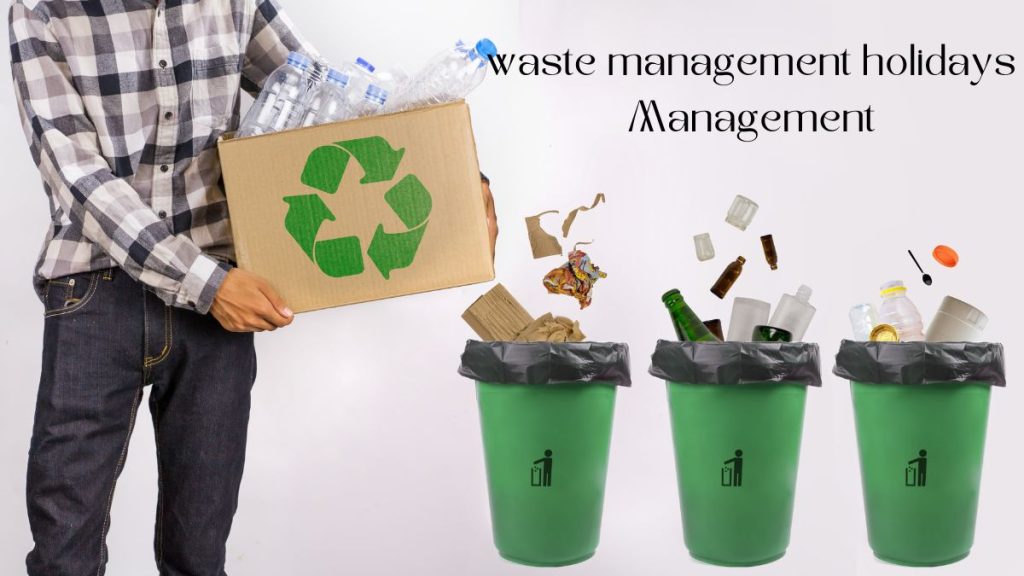Proper waste disposal is an important part of protecting the environment and keeping people healthy. Understanding waste management holidays is a crucial but often forgotten part of the process. These are the days when regular garbage pickup hours may be changed or delayed due to holidays. In this detailed tutorial, we’ll discuss the various holidays associated with garbage management, how they could alter your regular waste disposal schedule, and the steps you can take to keep everything in order.
What Are Waste Management Holidays?
Public holidays may necessitate adjustments to the usual schedule for the collection and disposal of waste, a practice known as waste management holidays, trash collection holidays, or garbage pickup holidays. These celebrations might differ from nation to nation, state to state, and even municipality to municipality. To minimize hassles and keep things tidy, knowing when your local waste disposal company will be closed on holidays is essential.
Why Do Waste Management Holidays Matter?
Waste management holidays matter for several reasons:
Service Disruptions
Trash pickup is often rescheduled or postponed on holidays observed by waste management companies. This can lead to trash cans becoming overflowing, which is not only ugly but also dangerous to human health and the environment.
Environmental Impact
Holidays can be a particularly dangerous time for wildlife due to the increased trash that can result from improper waste disposal. Without proper waste management, it can also contribute to environmental degradation by fouling the air and water.
Public Health Concerns
Uncollected garbage can serve as a breeding ground for disease-carrying rats and insects. The health of locals can also be negatively impacted by the garbage piles’ foul stench.
Legal Consequences
In some regions, there are financial penalties for disregarding holiday trash management guidelines. Avoiding legal trouble requires keeping up with and obeying all applicable local laws and regulations.
How to Prepare for Waste Management Holidays
You should take the following measures to ensure proper garbage disposal now that you know the significance of waste management holiday’s:
Know Your Local Schedule
Before anything else, study up on the local garbage collection holidays. You can inquire with your local waste management authority, check the website for your municipality, or read community bulletins to learn about these things.
Plan Ahead
It’s important to prepare ahead of time for holidays related to garbage management. Before the holiday, get rid of any food waste or other objects that will spoil and attract bugs by throwing them away.
Reduce, Reuse, Recycle
Reduce, reuse, and recycle are the three pillars of effective waste management. Buy products with little packaging and recycle or reuse materials whenever feasible to reduce your impact on the environment. Reduce the need for trash pickups by properly sorting recyclables.
Use Compost Bins
Use a compost container for yard waste and kitchen scraps if you have access to one. When there are breaks in waste collection, composting can be a more environmentally responsible option than sending trash to landfills.
Secure Your Trash
During power outages, you should have solid trash cans or bins that animals won’t be able to open and rummage through. Check to see that they are closed tightly and not bursting.
Educate Others
Raise people’s consciousness about the importance of celebrating waste management holidays. Please tell your friends and neighbors to do their part and educate themselves on proper garbage disposal procedures.
Conclusion
Maintaining a clean and sustainable environment requires waste management holidays, which may cause inconvenience to your weekly garbage collection schedule. You can help your community and the world by protecting it for future generations if you take the time to learn the local schedule, prepare ahead of time, and implement acceptable waste management methods. Always keep in mind that proper waste disposal is a year-round obligation.
FAQs
1. What is e-waste, and how should I dispose of it responsibly?
E-waste, or electronic garbage, refers to obsolete or broken electronic devices. If you want to get rid of it in a responsible manner, you should see if the area where you live has any programs for recycling electronic garbage. If not, try to find any local electronics recycling events or centers.
2. Can I recycle plastic bags with my regular curbside recycling?
Your standard curbside recycling bin is not the place for plastic bags. You may recycle your plastic bags at most supermarkets. They can cause problems with recycling equipment if they get tangled up in it.
3. How can I dispose of hazardous waste, like old paint or batteries, safely?
Never put anything that could be considered hazardous in with your ordinary trash. Learn where you may dispose of hazardous materials in your neighborhood. They have the appropriate tools for the safe management and disposal of such substances.
4. Is it better to repair or replace broken appliances for eco-friendliness?
It is more environmentally friendly to repair appliances rather than replace them. It helps save resources by decreasing excess use. If you have an older appliance, you may want to look into repair possibilities before buying a replacement.
5. What are some creative ways to repurpose common household items instead of throwing them away?
Many commonplace items can be put to new uses. Make art out of cardboard boxes, use used newspapers as packing material, or transform glass jars into storage containers. Use your ingenuity to cut down on trash.







